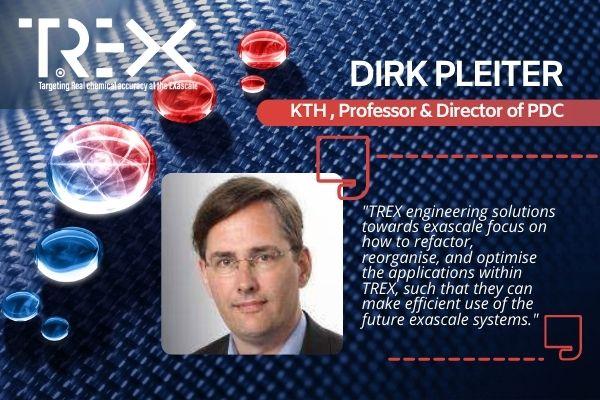
TREX: Creating engineering solutions for exascale
TREX, Targeting Real chemical accuracy at the EXascale, is an European Centre of Excellence (CoE) in Exascale Computing bringing together computational scientists, chemists, and physicists to further develop highly-accurate methods for quantum mechanical simulations to take advantage of the huge computational power of upcoming exascale architectures. The ambition of this project is to get prepared for the next generation of high performance computing (HPC) machines with forward-looking software solutions. To this aim, the TREX team will exploit and foster the use of supercomputers with energy-efficient accelerators (e.g., GPU) using state-of-the-art quantum Monte Carlo (QMC) codes, internationally recognized as key algorithmic assets.
Within the TREX project, engineering solutions for exascale computing comprise the generation of the high-performance library QMCkl, optimised for upcoming supercomputers in co-design with the HPC partners. The team within the work package (WP3), led by the KTH Royal Institute of Technology, will take care of the benchmarking and profiling activities of TREX software with respect to different hardware features. The team will also explore and implement methods based on lower and mixed-precision arithmetic.
TREX engineering solutions towards exascale focus on how to refactor, reorganise, and optimise the applications within TREX, such that they can make efficient use of the future exascale systems. - Dirk Pleiter, Professor and Director of PDC, KTH Royal Institute of Technology
The Objectives:
- Implement high-performance software layers and components optimised for relevant upcoming supercomputers, in particular the upcoming EuroHPC systems.
- Provide empirical data and knowledge related to performance characteristics of QMC applications and more specifically the QMCkl library, a domain-specific library which will permit to run massive simulations.
- Develop, explore, and implement numerical methods based on lower and mixed-precision arithmetics and validate their results.
Our goal is to bring together the developers of QMC codes, the computational and domain scientists, and the experts from the HPC and technology domain, who have in-depth knowledge and understanding about architectures, in finding optimal solutions which will prepare the TREX applications for the upcoming exascale in Europe. - Dirk Pleiter, Professor and Director of PDC, KTH Royal Institute of Technology
In 3 years, the project is aiming to achieve two important goals for highly-accurate stochastic quantum simulations:
- Having a larger number of codes which can scale-up on the upcoming exascale systems, and demonstrating an outstanding exploitation on the currently installed pre-exascale in Europe.
- Sharing more codes between the different TREX applications considering separate concerns between (1) algorithms and scientific problems tackled by computational scientists, and (2) performance-critical parts of the code needing to be specifically optimised for different kinds of supercomputers.
Video interview of Dirk Pleiter, Professor and Director of PDC at KTH


